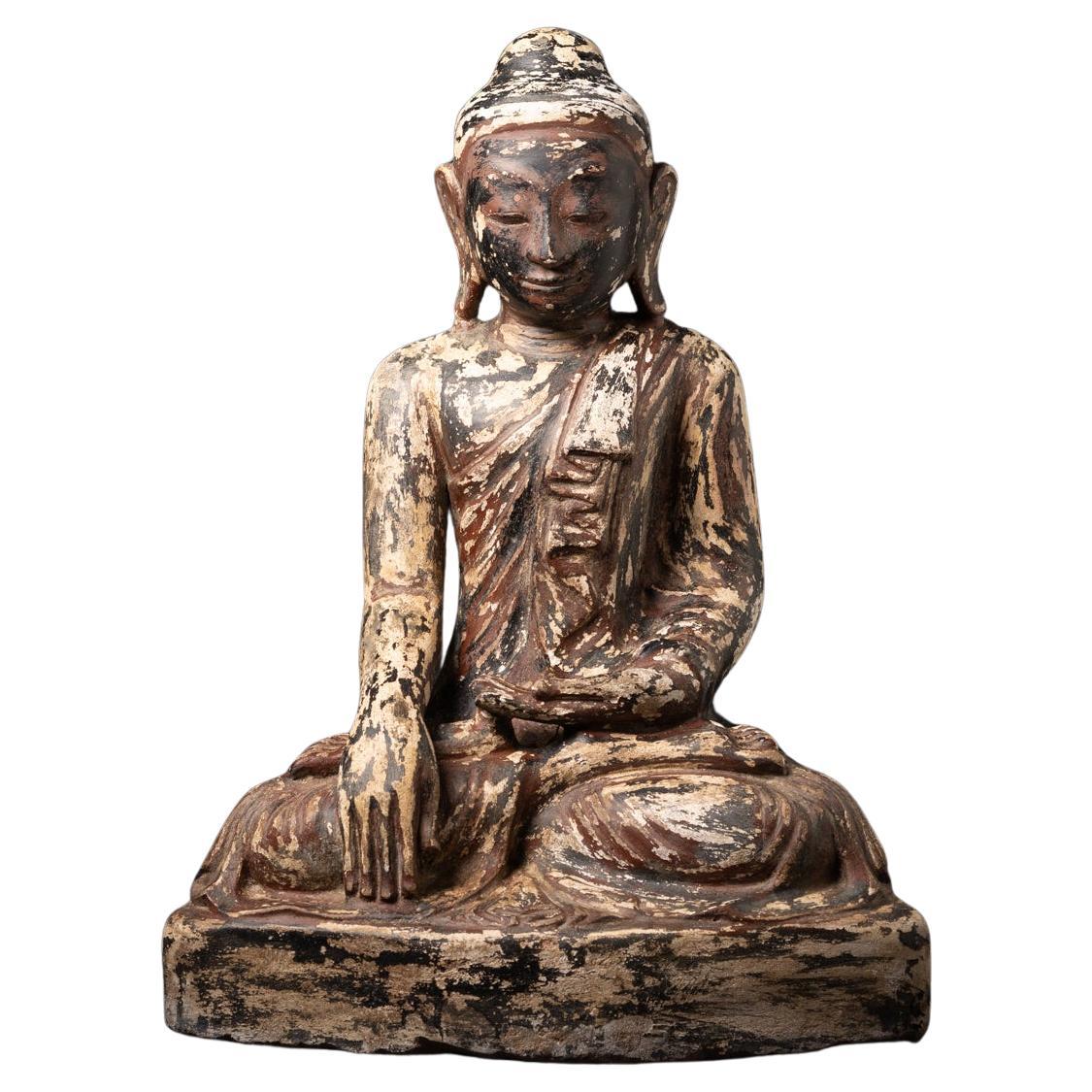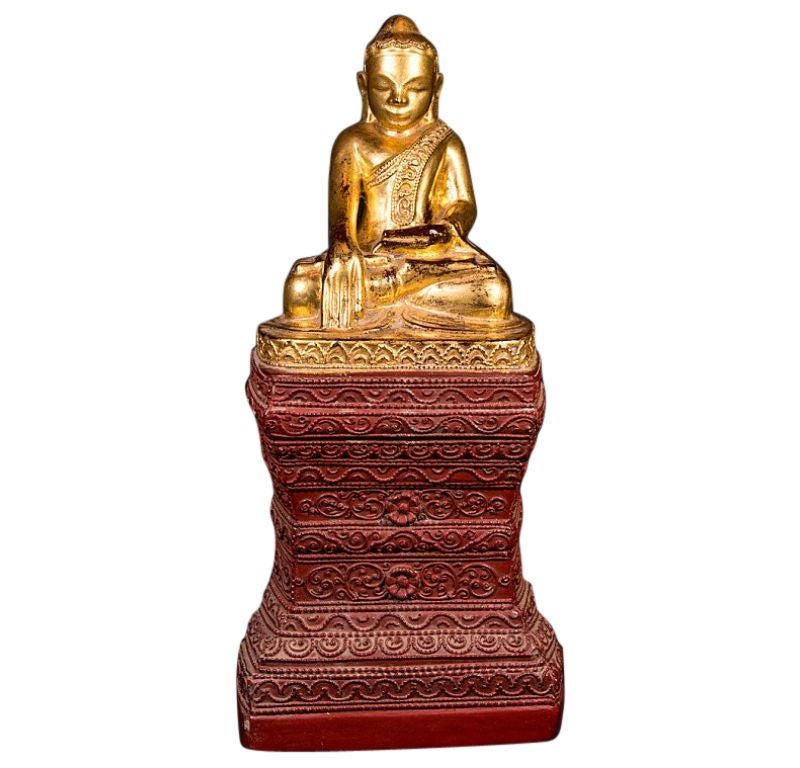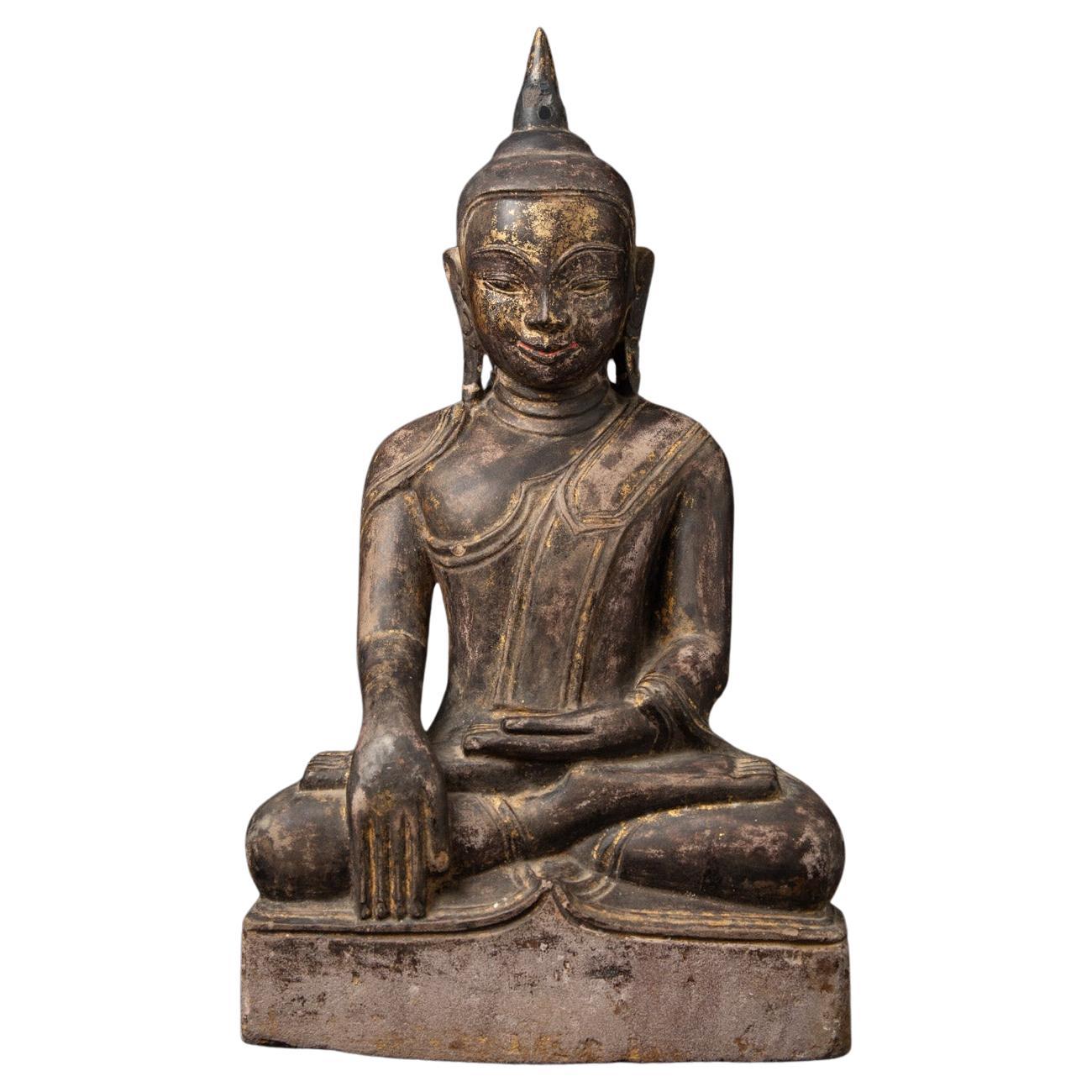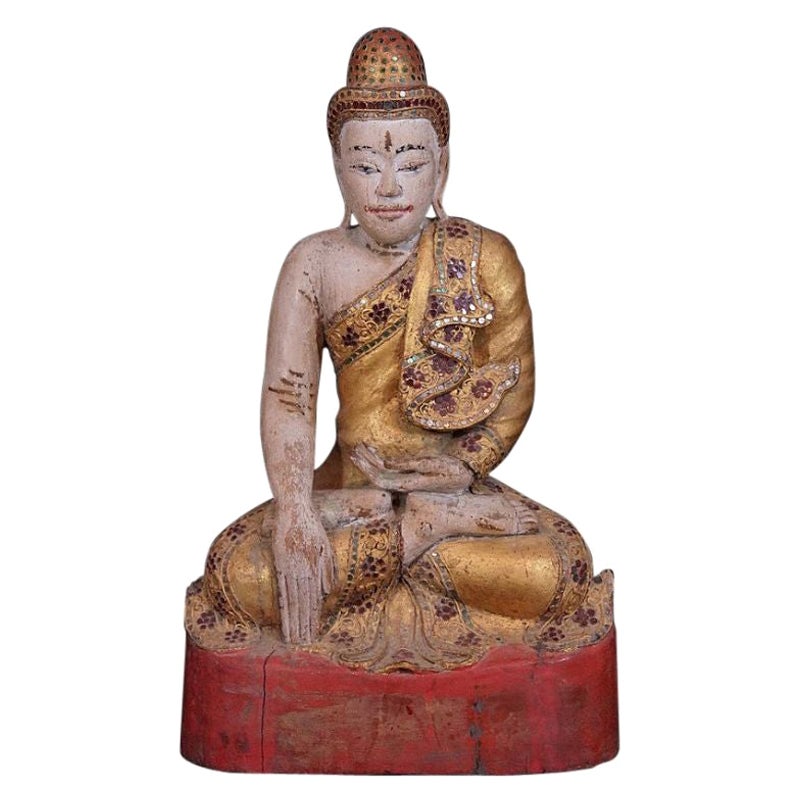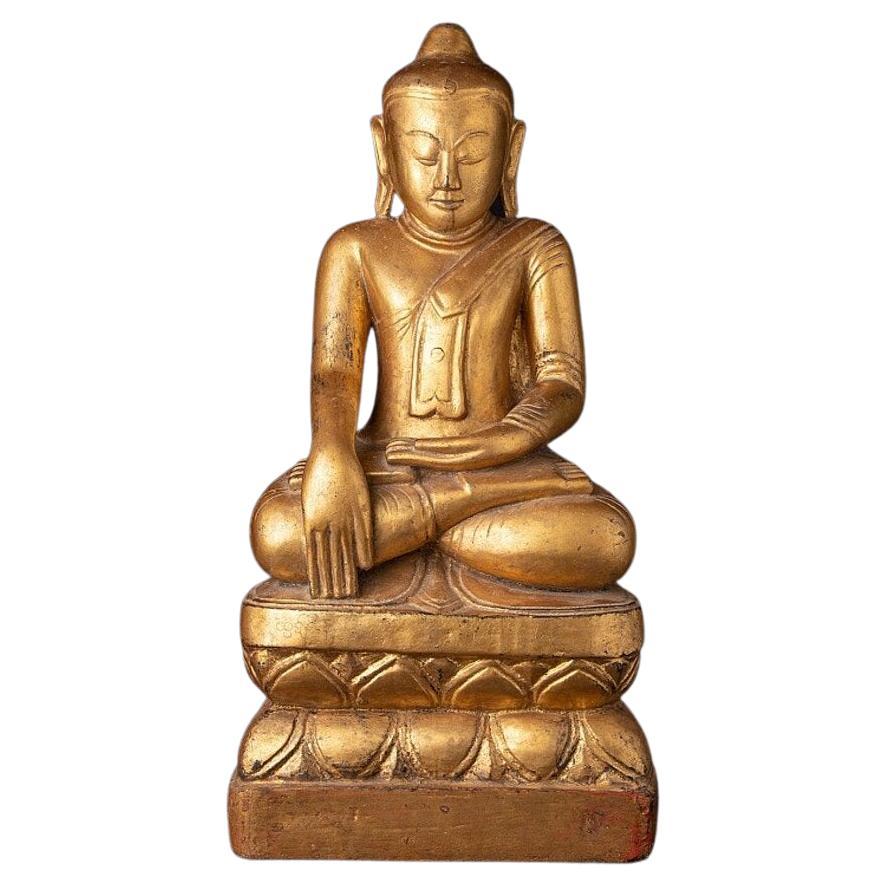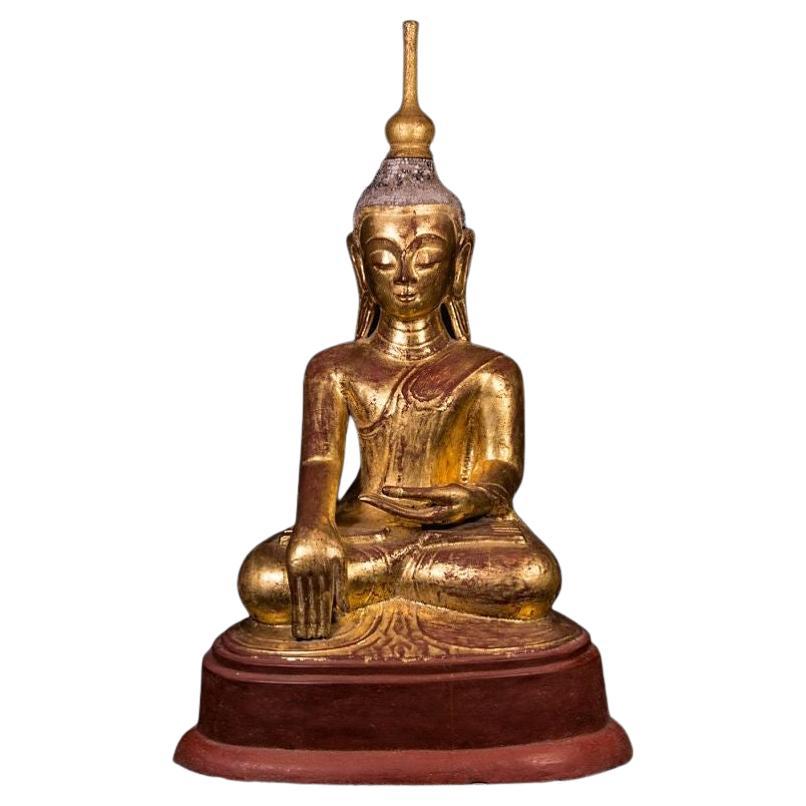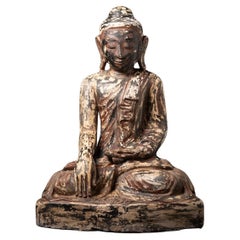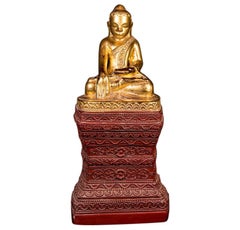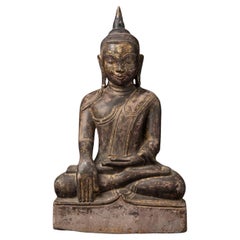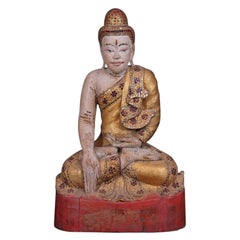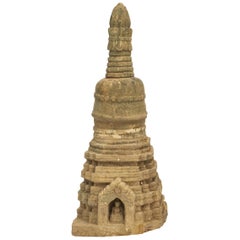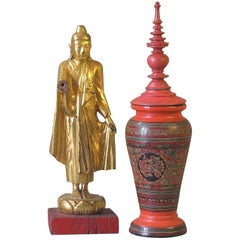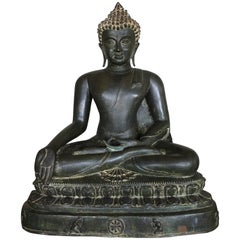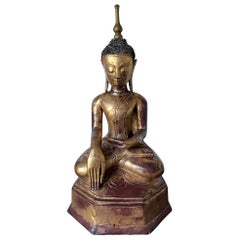Items Similar to Antique Burmese Sandstone Buddha Statue from Burma
Video Loading
Want more images or videos?
Request additional images or videos from the seller
1 of 21
Antique Burmese Sandstone Buddha Statue from Burma
About the Item
Material: Sandstone
Material: wood
60,2 cm high
32,3 cm wide and 19,7 cm deep
Weight: 26.35 kgs
With traces of 24 krt. gold
Ava style
Bhumisparsha mudra
Originating from Burma
17-18th century.
- Dimensions:Height: 23.71 in (60.2 cm)Width: 12.72 in (32.3 cm)Depth: 7.76 in (19.7 cm)
- Materials and Techniques:
- Place of Origin:
- Period:Late 17th Century
- Date of Manufacture:17th-18th Century
- Condition:Wear consistent with age and use.
- Seller Location:DEVENTER, NL
- Reference Number:Seller: 33881stDibs: LU7845232182792
About the Seller
5.0
Gold Seller
Premium sellers maintaining a 4.3+ rating and 24-hour response times
Established in 1997
1stDibs seller since 2022
52 sales on 1stDibs
Typical response time: 6 hours
- ShippingRetrieving quote...Shipping from: DEVENTER, Netherlands
- Return Policy
Authenticity Guarantee
In the unlikely event there’s an issue with an item’s authenticity, contact us within 1 year for a full refund. DetailsMoney-Back Guarantee
If your item is not as described, is damaged in transit, or does not arrive, contact us within 7 days for a full refund. Details24-Hour Cancellation
You have a 24-hour grace period in which to reconsider your purchase, with no questions asked.Vetted Professional Sellers
Our world-class sellers must adhere to strict standards for service and quality, maintaining the integrity of our listings.Price-Match Guarantee
If you find that a seller listed the same item for a lower price elsewhere, we’ll match it.Trusted Global Delivery
Our best-in-class carrier network provides specialized shipping options worldwide, including custom delivery.More From This Seller
View AllOld sandstone Buddha statue from Burma
Located in DEVENTER, NL
Material: Sandstone
Material: wood
78 cm high
57.5 cm wide and 38 cm deep
Weight: 75,95 kgs
Gilded with 24 krt. gold
Ava style
Bhumisparsha mudra
Originating from Burma
Middle 20th ...
Category
Mid-20th Century Burmese Sculptures and Carvings
Materials
Sandstone
Old Sandstone Buddha Statue from Burma
Located in DEVENTER, NL
Material: Sandstone
Material: wood
42 cm high
18,5 cm wide and 13 cm deep
Weight: 7.8 kgs
Gilded with 24 krt. gold
Ava style
Bhumisparsha mudra
Originating from Burma
Middl...
Category
Mid-20th Century Burmese Sculptures and Carvings
Materials
Wood
18th century Antique Burmese sandstone Buddha statue from Burma
Located in DEVENTER, NL
Unearth the spiritual grandeur of this Antique Burmese sandstone Buddha statue, an 18th-century masterpiece from Burma (Myanmar) that embodies the sacred artistry and cultural legacy...
Category
Antique 18th Century Burmese Sculptures and Carvings
Materials
Sandstone
Antique Burmese Buddha Statue from Burma
Located in DEVENTER, NL
Material: wood
Measures: 49 cm high
29 cm wide
Weight: 5.35 kgs
Gilded with 24 krt. gold
Mandalay style
Bhumisparsha mudra
Originating from Burma
19th century.
Category
Antique 19th Century Burmese Sculptures and Carvings
Materials
Wood
Antique Burmese Buddha Statue from Burma
Located in DEVENTER, NL
Material: wood
64 cm high
32,6 cm wide and 20,7 cm deep
Weight: 9.45 kgs
Gilded with 24 krt. gold
Bhumisparsha mudra
Originating from Burma
18th century
With inscriptions in...
Category
Antique 18th Century Burmese Sculptures and Carvings
Materials
Wood
Antique Burmese Buddha Statue from Burma
Located in DEVENTER, NL
Material: lacquerware
87 cm high
52 cm wide and 38,5 cm deep
Weight: 5.25 kgs
Gilded with 24 krt. gold
Ava style
Bhumisparsha mudra
Originating from Burma
Early 19th century...
Category
Antique Early 19th Century Burmese Sculptures and Carvings
Materials
Lacquer
You May Also Like
400-600 Year Old Burmese Sandstone Stupa Pagoda Sculpture
Located in Kastrup, DK
Rare stupa sculpture, 400-600 years old, carved in sandstone. In original untouched, well-preserved condition. From Arakan in Burma.
Typical stupa construction with square base, hemispherical dome and conical spire.
At the base a portal door...
Category
Antique 16th Century Burmese Other Sculptures and Carvings
Materials
Sandstone
Burmese Mandalay Style Gilt Lacquered Buddha & Red Lacquer Covered Baluster Vase
Located in Ottawa, Ontario
A Burmese Mandalay style gilt lacquered wood standing figure of Buddha and together with an unusual Burmese red lacquer covered baluster offering vas...
Category
20th Century Burmese Chinese Export Sculptures and Carvings
Materials
Wood, Lacquer
Large Burmese Bronze Medicine Buddha, Pagan Style, Late 19th Century
Located in Austin, TX
A large and magnificent cast bronze image of the Medicine Buddha, Bhaisajyaguru, rendered in the Burmese Pagan style, and most likely based on a period example that was either damaged or lost, 19th century, Burma or Thailand.
He can be identified as the Medicine Buddha by the hand that rests in his lap, with his middle finger touching the thumb. A medicine pot or fruit stem would originally have been placed in his upturned palm.
The face of this Buddha has been sculpted masterfully. He has a beautiful heart shaped face topped by hair neatly arranged in the typical "snail shell curls", and surmounted by a high ushnisha. Long, pendulous earlobes frame his face, a symbol of his princely past. He gazes serenely outwards from heavily lidded, downcast eyes, a content smile upon his full, lush lips.
The Buddha is portrayed seated in vajrasana (full lotus position), his elegant hands displayed in varada mudra, the gesture of granting favors and fulfilling wishes. Long, exquisite fingers extended, the thumb and middle finger touching in a gesture of compassion.
He is clothed in a simple kasaya wrapped around his body and over one shoulder, leaving the shoulder and part of his chest bare. The diaphanous garment clings to his body, outlining his well proportioned and graceful, almost sensuous, form. The excess material pooled in neat pleats in front of him. A sash thrown over his shoulder.
He sits upon a double lotus base upon a raised platform. The platform features two kneeling attendants, usually interpreted as the monks Ananda and Kasyapa. Between them is a circular disc representing the Wheel of Dharma. Contained in the disk is a flower with eight petals, symbolizing the eightfold path, one of the principle teachings of the Buddha.
The sides and back of the platform featuring a series of singha, or lions, representative of the Buddha's royal past.
An applied lacquer patina covers the entirety of the image. Large deposits of ash (from incense) are present between the curls of the hair, as well as some the other crevices, indicating this image was the subject of worship for many years.
Bhaisajyaguru, also called the Medicine Buddha, or Buddha of Healing, is a revered figure in the Buddhist pantheon as a master able to cure suffering, both physical and spiritual, through his teachings.
The Pagan Empire ruled most of present day Burma (Myanmar) from 849 to 1297. The capital, Bagan, served as a both the center of government and religion, where Buddhism reigned supreme. Bagan was also at a crossroads of the Buddhist world, with influence from India, Nepal, Tibet, China, and even Indonesia shaping their culture. As such, Pagan Buddha...
Category
Antique Late 19th Century Burmese Sculptures and Carvings
Materials
Bronze
Large Lacquered Wood Antique Burmese Buddha Statue
Located in Atlanta, GA
A gilt and lacquered wood Buddha statue from Southeast Asia likely Burma, circa 19th century. The Buddha is depicted as seating on a slightly taper...
Category
Antique 19th Century Burmese Other Sculptures and Carvings
Materials
Wood, Lacquer
Antique Original Thayo Burmese Burma Myanmar Asian Buddha Head Sculpture Statue
Located in Studio City, CA
An exceptionally beautiful, serene, delicately crafted, and extremely rare Burmese Buddha head/bust - hand-made using the ancient Thayo technique w...
Category
Early 20th Century Burmese Sculptures and Carvings
Materials
Wood, Giltwood, Lacquer
Antique Lopburi Buddha Statue from Thailand
Located in Atlanta, GA
The Buddha statue was made from a copper alloy in a standing position with hands in double Abhaya mudra. This mudra symbolizes the act of dispelling fear in the face of adversity. In Laos and Thailand where this mudra are used as one of the most iconic gestures, with its origin was pre-Buddhism era, when it was a symbol of good intentions and friendship when approaching strangers. In contrast to Indian iconography, it was often shown with both hands raised to the level of the shoulder in Southeast Asia. The statue was made in the classic Lopburi style, which historically was heavily influenced by Khmer art...
Category
Antique Late 18th Century Thai Other Sculptures and Carvings
Materials
Metal
Recently Viewed
View AllMore Ways To Browse
18th Century Wood Statues
Antique Sandstone Sculpture
Buddha Sandstone
Sandstone Burma
Ava Wood Buddha
Antique Sandstone Statue
Antique Samurai
Carved Coral Chinese
Gilded Bronze Buddha Statue
Indonesian Statue
Korean Temple
Antique Votive
Black Asian Pedestal
Buddhist Altar
Carved Asian Man Sculpture
Wabi Sabi Antique Sculpture
Antique Cast Bronze Bells
Buddha Box
